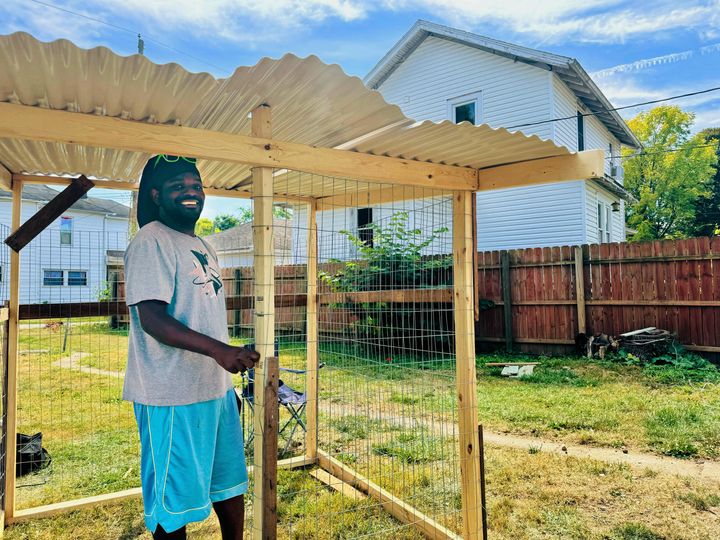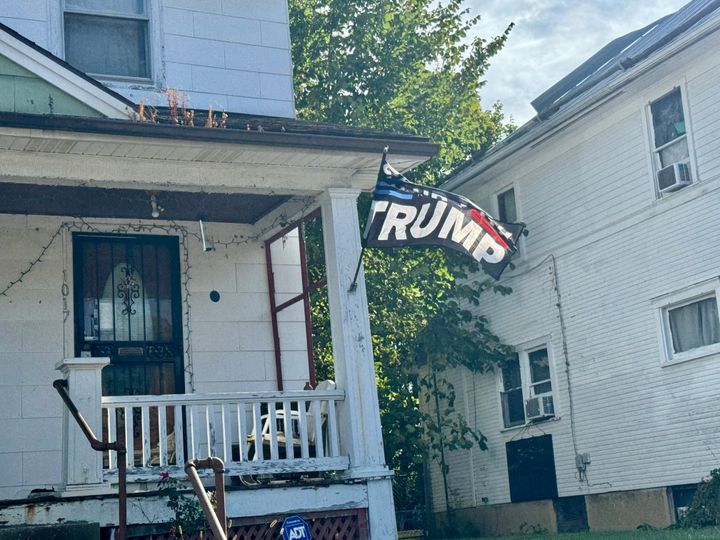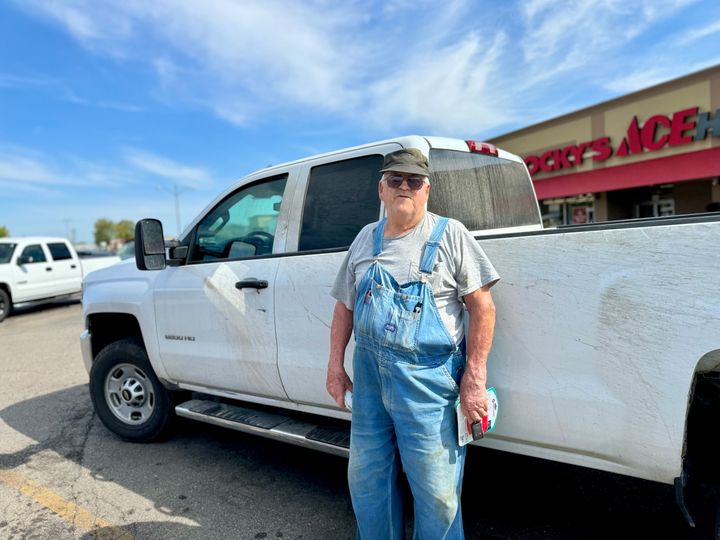
SPRINGFIELD, Ohio — Joe and Cheryl Backus have plenty of concerns over the influx of immigrants to this central Ohio city.
“They’re giving up on our homeless here,” Joe Backus, a retired 80-year-old, said from a loveseat in his living room, referring to the general strain population growth is having on certain sectors of the local government. “They’re ignoring them.”
But the spotlight Donald Trump and his running mate, Ohio’s own junior U.S. Sen. JD Vance, have put on Springfield and its estimated 60,000 residents hasn’t helped matters — whipping up tensions here to a potentially dangerous degree after the former president baselessly suggested to a live debate audience of 67 million people last week that foreigners here were eating cats and dogs. It’s quickly upended life, leading to bomb threats and general threats of violence that closed schools and government offices.
“I think here in this town, we’re going to have a — well, you wouldn’t call it a civil war — but an uprising,” said Joe Backus, a Democrat who’s in the minority of this red county that went twice for Trump. “Because I think people are going to get tired.”
From a recliner across the room, Cheryl Backus, 67, recoiled at the idea of people associating Springfield with the consumption of pets. “Eating the cats and dogs? No, no, no, no, no. We don’t need — no.”
The GOP ticket has made this blue-collar city a Midwestern front in the party’s immigration wars, stoking fears about a reign of terror that includes reckless driving and pet-snatching — all as Republicans continue to blame Democrats for a glut of asylum seekers and illegal crossings at the southern border in an election year when Republicans tanked their own border security bill to help Trump.

At the center of it all are people like Steven Pierre, a 32-year-old who emigrated to Springfield from Haiti at age 12. Now he’s a married father of four and works for Amazon. He has a dog, Baba.
“It’s sad, because I gotta hear this, and my kids gotta ask questions about it,” said Pierre, who was building a chicken coop in the back of a pristine white home as Baba looked on. “And it’s like, what do I tell them?”
“They’re not here to bother anybody,” Pierre said of the Haitians. “They’re here for a goal and to get on with their life. We’re just regular people. We want to be left alone.”
Vance, who grew up an hour south of Springfield in a challenged town he popularized in his memoir, acknowledged last week there was no basis for the viral pet smears. But Vance still told his followers to keep sharing the cat memes these rumors helped spawn.
The vice presidential nominee took it a step further Sunday, suggesting he spread the hoax for the greater good of the country. “If I have to create stories so that the American media actually pays attention to the suffering of the American people, then that’s what I’m going to do,” he said on CNN.
Trump also vowed to begin his planned mass deportation of immigrants in Springfield, where the Haitian population is mostly here legally, and claimed to know nothing about the bomb threats he helped stoke. “I don’t know what happened with the bomb threats. I know that it’s been taken over by illegal migrants, and that’s a terrible thing that happened,” Trump said Saturday.
The rhetoric is beginning to grate on members of even their own party.

Ohio Gov. Mike DeWine, who has a prickly relationship with Trump, went on TV this weekend to decry the drama surrounding Springfield as “unfortunate” and the pet rumors as “garbage.” He praised Springfield’s population of “hard-working” Haitians, who are able to work legally under a special immigration status afforded to immigrants from countries suffering from civil unrest or natural disasters. Springfield’s own GOP mayor, Rob Rue, said he was tired and angry, and wouldn’t reveal whether he’d vote for Trump in November.
All the attention has turned Springfield into a tinderbox. Right-leaning content creators are prowling the streets, hunting down evidence of pet-eating for a $5,000 bounty. Elementary and middle schools were closed or evacuated for two consecutive days last week due to threats. City Hall also closed due to security concerns, as several city commissioners found themselves targeted with threats.
“I think it’s disgusting,” said a 59-year-old Springfield resident who declined to give her name as she was exiting a trendy food hall and co-working space across from City Hall on Friday.
At a campaign stop Saturday, Democratic Sen. Sherrod Brown told reporters he’s been in touch with officials in Springfield about “[taking] the temperature down.” Brown’s Republican opponent, Bernie Moreno, an immigrant himself, had made an appearance in Springfield earlier that day, echoing Trump’s call for mass deportations and blasting Vice President Kamala Harris and “corrupt” politicians for condoning immigration laws that allow Haitian refugees to enter the country and work here legally.
“We need to quit using these issues as political talking points and to political advantage,” Brown said after his stop at a plumbers and pipe-fitters union hall. “Most people want to see this community thrive together.”
A government outreach coordinator who wasn’t authorized to speak for the city said the threats against schools in particular are having devastating consequences. “Right now, we need more inclusion and help, instead of basically having everybody pitted against each other,” she said. “Kids aren’t getting educated. People are afraid to go outside. I’m doing home visits to try to make sure our kids are OK. They’re hurting the wrong people.”
After decades of economic decline from factory off-shoring, the legal influx of Haitian immigrants seeking blue-collar work at factories and warehouses in Springfield struck a raw nerve in a community with a significant number of boarded-up buildings and homes, and longtime residents struggling to make ends meet. An estimated 20,000 Haitians have flocked to Springfield since the pandemic, stressing the city’s housing infrastructure, schools and hospitals.
“The people who have lived here pay taxes and support Springfield all their life. They cannot get help, because it’s all about [the Haitians],” said Carol Lawson, 65, who lives a block over from Pierre. Lawson, who said she does not work and collects disability, repeated an oft-cited complaint about the Haitians: That they drive nicer cars than everyone else and appear to be the beneficiaries of generous government support — even though Temporary Protected Status, while it affords a pathway to getting a Social Security card and eventual citizenship, does not automatically confer public benefits like food stamps.
Lawson said she doesn’t vote, but if she did “it would be Trump all the way.”
“I mean, he don’t walk on water, nobody does,” she said, but added that gas and food prices were better under his watch.
The divisions in Springfield seems to be cultural and generational, as younger multicultural residents displace the older, white population that grew up here.

“I have no problem with them becoming an American citizen,” said Jim Timmons, a 78-year-old dairy farmer who supports Trump. “If you thought you were going to the United States, you had plenty of time to learn how to speak English.”
Timmons said last Friday he expects life to go back to normal in Springfield in a few days, and doesn’t resent Trump for the attention he’s drawn here. “It will all die down and life will go on. As far as them eating whatever they want to eat, they were probably brought up that way,” said the farmer, who grew up raising groundhogs to sell for food. “There’s people that will pay good money for groundhog, because it’s good eating.”
Kelvin Stroman, a 57-year-old machine operator, has Haitian neighbors on both sides of his home and across the street. He said they mostly work and keep to themselves. There’s little drama — except for one home across from his that has multiple signs in both English and Haitian Creole warning trespassers to stay off the lawn.
Stroman learned about Haiti from a coworker he would sometimes drive home from work.
“He said the president got killed, that they were trying to kill the prime minister,” Stroman recalled, referring to the 2021 assassination of President Jovenel Moïse. “I asked him why did you leave? He said he just couldn’t take it anymore. Now he’s trying to get his wife and kids over. He said it’s just not a restful place.”
Disclaimer: The copyright of this article belongs to the original author. Reposting this article is solely for the purpose of information dissemination and does not constitute any investment advice. If there is any infringement, please contact us immediately. We will make corrections or deletions as necessary. Thank you.
